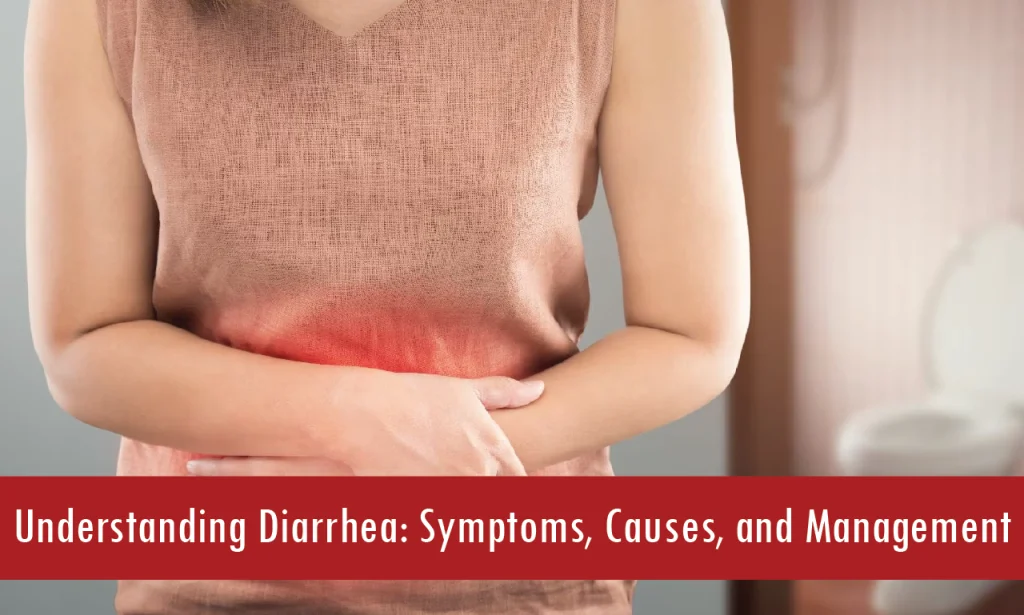Table of Contents
Diarrhea is more than just an occasional discomfort; it’s a prevalent health concern that affects millions globally. Despite its commonality, it’s often shrouded in misunderstanding. This condition, characterized by frequent, loose, or watery bowel movements, can range from a mild, short-lived inconvenience to a severe, even life-threatening health issue. Gaining a deeper understanding of diarrhea is not just about comfort, but it’s also crucial for safeguarding our health.
Discussing diarrhea might be a bit awkward for many, but recognizing its symptoms and causes is vital. This knowledge helps us differentiate between a minor issue that can be managed at home and a more serious condition requiring medical attention. From dietary indiscretions to infections, or even chronic diseases like irritable bowel syndrome, the causes of diarrhea are diverse and multifaceted.
But why is understanding diarrhea so important? It’s because this condition is more than an inconvenience; it can significantly impact our bodies and daily lives. For instance, dehydration is a common but serious complication of diarrhea, particularly dangerous for vulnerable groups like children and older adults. By being well-informed about the symptoms, causes, and management strategies for diarrhea, we are better equipped to handle this condition effectively, minimizing its disruption in our lives.
In the upcoming sections, we will explore the various aspects of diarrhea. Our focus will be on detailing its symptoms, unraveling the myriad of causes, and discussing effective management and treatment strategies. This guide aims to be a comprehensive resource, not just for those currently experiencing diarrhea but also for anyone interested in health and wellness. Whether you are directly affected, caring for someone, or simply eager to broaden your health knowledge, this guide will serve as an invaluable tool in understanding and managing this common yet complex health issue.
What is Diarrhea?
At its core, diarrhea is defined as having loose, watery stools during bowel movements, a condition that everyone experiences at some point in their lives. It’s not just about the stool consistency; it’s the increase in the frequency and volume of bowel movements that sets diarrhea apart from regular digestive fluctuations.
Common Symptoms of Diarrhea
When identifying diarrhea symptoms, the most evident one is the change in stool consistency – primarily watery stool. However, it’s crucial to note that diarrhea is not just about a single symptom. It often involves an increase in the frequency of bowel movements, accompanied by a sense of urgency. Other symptoms might include abdominal cramps, bloating, and in some cases, nausea.
The experience of diarrhea can vary significantly between adults and children. Adults might be able to articulate their discomfort and recognize dehydration signs, whereas children, particularly young ones, might not. This makes it imperative to be observant of any changes in their bathroom habits or general wellbeing. In both age groups, prolonged diarrhea is a concern and should be addressed by a healthcare professional.
In the following sections, we will delve deeper into the various facets of diarrhea. Understanding these basics sets the foundation for recognizing when this common condition might be a sign of something more serious, prompting timely and appropriate responses.
Digging Deeper: Causes and Triggers
Major Causes of Diarrhea
Diarrhea can be triggered by a variety of factors. The most common ones include infections caused by viruses, bacteria, and parasites, often spread through contaminated food or water. Another significant cause is food intolerance, such as difficulty in digesting lactose found in dairy products. It’s crucial to differentiate between acute diarrhea, which is typically short-lived and often related to infections or dietary choices, and chronic diarrhea, which persists for longer periods and may indicate underlying health conditions like irritable bowel syndrome or inflammatory bowel disease.
How Food and Medicine Influence Diarrhea
Diet and medications are significant contributors to diarrhea. Certain foods, especially those high in fats, spices, or artificial sweeteners, can lead to digestive upset. Likewise, some medications, particularly antibiotics, can disrupt the gut’s bacterial balance, resulting in diarrhea. Understanding these interactions is key to managing and preventing diarrhea related to diet and medication.
The Role of the Digestive System
The health of the digestive system is closely linked to diarrhea. Disorders like irritable bowel syndrome and inflammatory bowel disease directly impact the digestive process, often leading to diarrhea. These conditions might cause other symptoms like abdominal pain and bloating, emphasizing the need for comprehensive diagnosis and treatment.
By exploring these causes and triggers, we can better understand how to manage and prevent diarrhea, reducing its impact on our daily lives and overall health.
Diarrhea and Dehydration: A Dangerous Duo
How Persistent or Chronic Diarrhea Can Lead to Dehydration
The link between persistent or chronic diarrhea and dehydration is a critical health concern. Diarrhea increases the body’s fluid output, and when prolonged, it can lead to a significant loss of water and essential minerals known as electrolytes. This loss can disrupt the balance of fluids in the body, which is particularly dangerous as it can affect vital bodily functions. The risk is higher in cases of chronic diarrhea, where the body endures this fluid loss over a longer period, often leading to more severe dehydration if not properly managed.
Recognizing Signs of Dehydration
It’s crucial to be vigilant in recognizing the signs of dehydration, especially in vulnerable groups like older adults and children. Common symptoms include dry mouth, decreased urine output, fatigue, dizziness, and in severe cases, confusion or faintness. In children, additional signs might include a lack of tears when crying, dry diapers for several hours, sunken eyes or cheeks, and lethargy or irritability. Early recognition and response to these signs can prevent more serious complications.
Recognizing Symptoms of Dehydration
Understanding the symptoms of dehydration can be lifesaving, particularly in older adults and children with diarrhea. In older adults, dehydration might manifest subtly with symptoms like confusion, weakness, or urinary tract infections. For children, watch for decreased frequency of urination, dry mouth, lack of energy, and sunken eyes or cheeks. Being aware of these symptoms is essential for prompt intervention, which might include rehydration solutions or medical assistance, especially if the symptoms are severe or persistent.
By understanding the interplay between diarrhea and dehydration, and recognizing the symptoms of dehydration, we can take proactive steps to manage these conditions effectively. This knowledge is vital in preventing the escalation of symptoms and safeguarding health, particularly in the most susceptible groups.
Treatment and Management
Over-the-Counter Medicine for Diarrhea
When it comes to managing diarrhea, over-the-counter (OTC) medicines play a pivotal role. One of the most common and effective OTC treatments is bismuth subsalicylate, which works by reducing the frequency of bowel movements and alleviating gastrointestinal symptoms associated with diarrhea. Other OTC options include loperamide, which slows down gut movement and reduces the urgency and frequency of bowel movements. It’s important to use these medications as directed and to be aware that they may not be suitable for everyone, such as young children or individuals with certain medical conditions. Consulting with a healthcare provider is recommended if there are any doubts about the suitability of these medications.
Home Remedies and Lifestyle Changes
In addition to medication, various home remedies and lifestyle changes can significantly aid in both the treatment and prevention of diarrhea. Hydration is key; drinking plenty of fluids, including water, clear broths, and oral rehydration solutions, can help maintain hydration levels. Dietary changes can also be beneficial. This includes consuming a bland diet (like the BRAT diet – bananas, rice, applesauce, and toast) during active episodes of diarrhea and gradually reintroducing regular foods as symptoms improve.
Preventive measures are equally important. Practicing good hygiene, such as regular handwashing, and ensuring food is properly prepared and stored can reduce the risk of diarrhea caused by infections. Additionally, being cautious about what you eat and drink, especially in areas where food and water safety is a concern, can help prevent traveler’s diarrhea.
By combining the appropriate use of over-the-counter medications with practical home remedies and lifestyle adjustments, individuals can effectively manage and control the symptoms of diarrhea, reducing its impact on their daily lives.
Key Takeaways
In summarizing the critical points about diarrhea, its causes, and treatments, there are several key takeaways to remember:
- Definition and Symptoms: Diarrhea is characterized by loose, watery stools, often accompanied by an increased frequency of bowel movements. Symptoms can vary, but typically include abdominal cramps, bloating, and urgency.
- Common Causes: Diarrhea can be triggered by a variety of factors, including infections from viruses, bacteria, and parasites, food intolerances (like lactose intolerance), and the use of certain medications (notably antibiotics). Differentiating between acute and chronic diarrhea is essential for appropriate management.
- Dehydration Risks: A significant health concern associated with diarrhea is dehydration, particularly in vulnerable groups like children and older adults. Recognizing the signs of dehydration, such as dry mouth, fatigue, and decreased urine output, is crucial for timely intervention.
- Treatment Approaches: Management of diarrhea includes over-the-counter medications like bismuth subsalicylate and loperamide, as well as home remedies and lifestyle changes. Staying hydrated, following a bland diet during active episodes, and practicing good hygiene are all effective strategies.
- Preventive Measures: Prevention is key and involves maintaining good hygiene, being cautious about food and water intake (especially in high-risk areas), and understanding personal dietary triggers.
Remember, while diarrhea is commonly a self-limiting condition, seeking medical advice is important if symptoms are severe, persistent, or accompanied by other concerning signs such as high fever or blood in the stool. This comprehensive understanding of diarrhea and its management can help individuals effectively navigate this common health issue, ensuring better overall health and well-being.
FAQ
What is the difference between acute and chronic (persistent) diarrhea?
Acute diarrhea typically lasts a few days to a week and is often caused by an infection or dietary factors. Chronic or persistent diarrhea lasts for several weeks or longer and may indicate an underlying health issue, such as irritable bowel syndrome or inflammatory bowel disease.
How is diarrhea diagnosed?
Diagnosis usually starts with a medical history and physical exam. In cases of persistent diarrhea, doctors may order tests such as stool analysis, blood tests, or imaging studies to determine the underlying cause.
What are some common treatments for diarrhea?
For acute diarrhea, treatment focuses on hydration and diet. Over-the-counter medications like bismuth subsalicylate can be used. For chronic diarrhea, treatment depends on the underlying cause and may involve prescription medications, dietary adjustments, and sometimes lifestyle changes.
Can diarrhea be prevented?
While not all cases can be prevented, reducing the risk involves practicing good hygiene, being cautious about food and water intake, especially in areas with higher risk, and understanding personal dietary triggers.
When should I see a doctor for diarrhea?
Consult a doctor if diarrhea is severe, persists for more than a few days, or is accompanied by symptoms like high fever, blood in the stool, severe pain, or signs of dehydration.
Is diarrhea dangerous for children and older adults?
Yes, it can be, especially due to the higher risk of dehydration. It’s important for caregivers to monitor hydration levels and seek medical attention if there are signs of dehydration or other severe symptoms.
Can changes in diet help manage diarrhea?
Yes, during episodes of diarrhea, following a bland diet (like the BRAT diet) and avoiding foods that can aggravate the digestive system can help. Gradually reintroducing regular foods as symptoms improve is also recommended.
By addressing these common concerns, individuals can gain a better understanding of how to manage and respond to both acute and persistent diarrhea effectively.
Conclusion
In wrapping up our comprehensive look at diarrhea, its causes, symptoms, and management strategies, the overriding message is clear: consulting a healthcare provider for persistent diarrhea is crucial. While many cases of diarrhea are mild and resolve on their own, ongoing or severe symptoms should not be taken lightly. They can signal underlying health issues that require professional diagnosis and treatment.
Persistent diarrhea, especially when accompanied by symptoms like dehydration, blood in the stool, or high fever, warrants medical attention. A healthcare provider can offer tailored advice and treatment plans based on individual health needs and conditions. This step is vital not only for relief but also for preventing potential complications.
Moreover, understanding the role of effective management and preventive measures in dealing with diarrhea is key. Simple steps like maintaining good hygiene, being mindful of food and water safety, and knowing your body’s responses to certain foods and medications can go a long way in preventing diarrhea or managing its symptoms effectively.
In conclusion, while diarrhea is a common ailment, it should not be underestimated. Awareness, timely action, and medical guidance are essential in handling this condition effectively, ensuring that it remains a temporary discomfort rather than a serious health concern. Remember, health is holistic, and taking care of your digestive health is an integral part of maintaining overall well-being.



